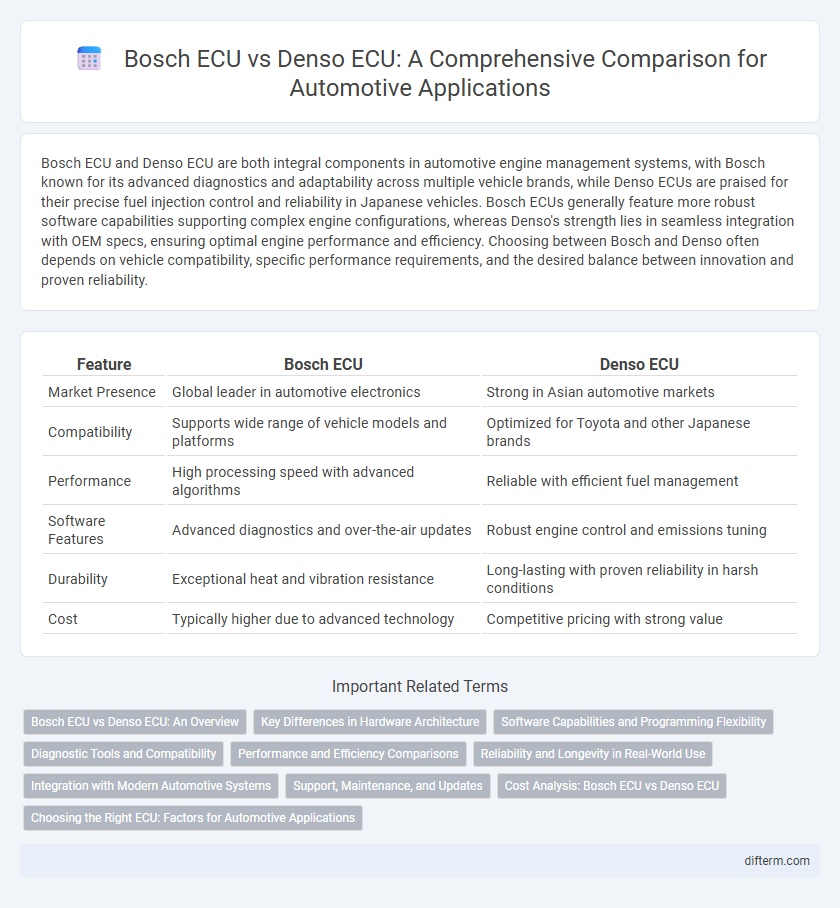Bosch ECU and Denso ECU are both integral components in automotive engine management systems, with Bosch known for its advanced diagnostics and adaptability across multiple vehicle brands, while Denso ECUs are praised for their precise fuel injection control and reliability in Japanese vehicles. Bosch ECUs generally feature more robust software capabilities supporting complex engine configurations, whereas Denso's strength lies in seamless integration with OEM specs, ensuring optimal engine performance and efficiency. Choosing between Bosch and Denso often depends on vehicle compatibility, specific performance requirements, and the desired balance between innovation and proven reliability.
Table of Comparison
| Feature | Bosch ECU | Denso ECU |
|---|---|---|
| Market Presence | Global leader in automotive electronics | Strong in Asian automotive markets |
| Compatibility | Supports wide range of vehicle models and platforms | Optimized for Toyota and other Japanese brands |
| Performance | High processing speed with advanced algorithms | Reliable with efficient fuel management |
| Software Features | Advanced diagnostics and over-the-air updates | Robust engine control and emissions tuning |
| Durability | Exceptional heat and vibration resistance | Long-lasting with proven reliability in harsh conditions |
| Cost | Typically higher due to advanced technology | Competitive pricing with strong value |
Bosch ECU vs Denso ECU: An Overview
Bosch ECU and Denso ECU are prominent automotive control units renowned for their precision and reliability in engine management. Bosch ECUs often excel in advanced diagnostics and adaptability across various vehicle models, while Denso ECUs are praised for their seamless integration with hybrid and electric vehicle systems. Both manufacturers leverage cutting-edge technology to optimize fuel efficiency, emission control, and real-time data processing in modern vehicles.
Key Differences in Hardware Architecture
Bosch ECU hardware architecture features a high-performance microcontroller with integrated diagnostics and scalable interfaces, enabling advanced real-time engine management and enhanced vehicle safety systems. Denso ECU emphasizes compact design with efficient processing units that support robust communication protocols and precise fuel injection control for improved engine efficiency. Both systems prioritize reliability, but Bosch offers more modularity for customization, whereas Denso focuses on seamless integration with OEM components.
Software Capabilities and Programming Flexibility
Bosch ECU offers advanced software capabilities with highly customizable control algorithms and seamless integration with various vehicle systems, enabling precise engine management and emissions control. Denso ECU is known for its robust programming flexibility, supporting over-the-air updates and adaptive software tuning tailored to diverse automotive applications. Both ECUs provide reliable communication protocols, but Bosch excels in comprehensive diagnostics while Denso emphasizes ease of reprogramming for aftermarket modifications.
Diagnostic Tools and Compatibility
Bosch ECU offers extensive compatibility with a wide range of diagnostic tools, supporting OBD-II protocols and proprietary software for detailed fault analysis and real-time data monitoring. Denso ECU provides seamless integration with Denso's proprietary diagnostic systems alongside universal tools, ensuring efficient troubleshooting and system calibration. Both brands prioritize diagnostic accuracy, but Bosch's ECUs often deliver broader third-party tool support, enhancing versatility for automotive technicians.
Performance and Efficiency Comparisons
Bosch ECU systems are renowned for their advanced real-time processing capabilities and adaptive learning algorithms, delivering superior engine performance and optimized fuel efficiency. Denso ECU units emphasize precision fuel injection control and robust durability, often resulting in consistent efficiency under varied driving conditions. Both manufacturers implement cutting-edge sensor integration, but Bosch's emphasis on dynamic tuning provides a slight edge in performance responsiveness.
Reliability and Longevity in Real-World Use
Bosch ECU systems are renowned for their robust engineering and extensive testing, resulting in high reliability and longevity in diverse driving conditions. Denso ECUs offer advanced thermal management and precise control algorithms that enhance durability and consistent performance over extended use. Real-world data indicates Bosch ECUs excel in extreme environments, while Denso units provide dependable operation with efficient energy management, making each suited for different automotive demands.
Integration with Modern Automotive Systems
Bosch ECUs offer advanced integration with modern automotive systems through their robust connectivity options and standardized communication protocols like CAN, LIN, and FlexRay, facilitating seamless interaction with ADAS and infotainment systems. Denso ECUs are engineered for high compatibility with hybrid and electric vehicle architectures, supporting real-time data exchange and precise control of powertrain and safety functions. Both Bosch and Denso prioritize cybersecurity features, enabling secure firmware updates and protecting vehicle networks against emerging threats.
Support, Maintenance, and Updates
Bosch ECU offers extensive support with a global network of service centers ensuring quick maintenance and comprehensive software updates tailored for various vehicle models. Denso ECU provides reliable maintenance backed by strong manufacturer collaboration, delivering frequent firmware updates to enhance performance and compatibility. Both Bosch and Denso invest heavily in continuous ECU improvements, but Bosch's broader support infrastructure often leads to faster troubleshooting and enhanced long-term reliability.
Cost Analysis: Bosch ECU vs Denso ECU
Bosch ECUs generally cost more upfront due to advanced features and broad compatibility, while Denso ECUs offer competitive pricing with reliable performance tailored to specific vehicle models. Bosch invests heavily in research and innovation, leading to higher manufacturing costs reflected in the ECU price. Denso provides cost-effective solutions suitable for budget-conscious automotive manufacturers without significantly compromising quality.
Choosing the Right ECU: Factors for Automotive Applications
Selecting the right ECU for automotive applications involves evaluating factors such as compatibility with engine management systems, software flexibility, and brand reliability. Bosch ECUs are renowned for advanced diagnostics and broad vehicle platform integration, while Denso ECUs offer precision in fuel injection control and efficient emission management. Prioritizing the specific requirements of engine type, performance goals, and after-sales support is essential for optimal ECU selection.
bosch ECU vs denso ECU Infographic

 difterm.com
difterm.com